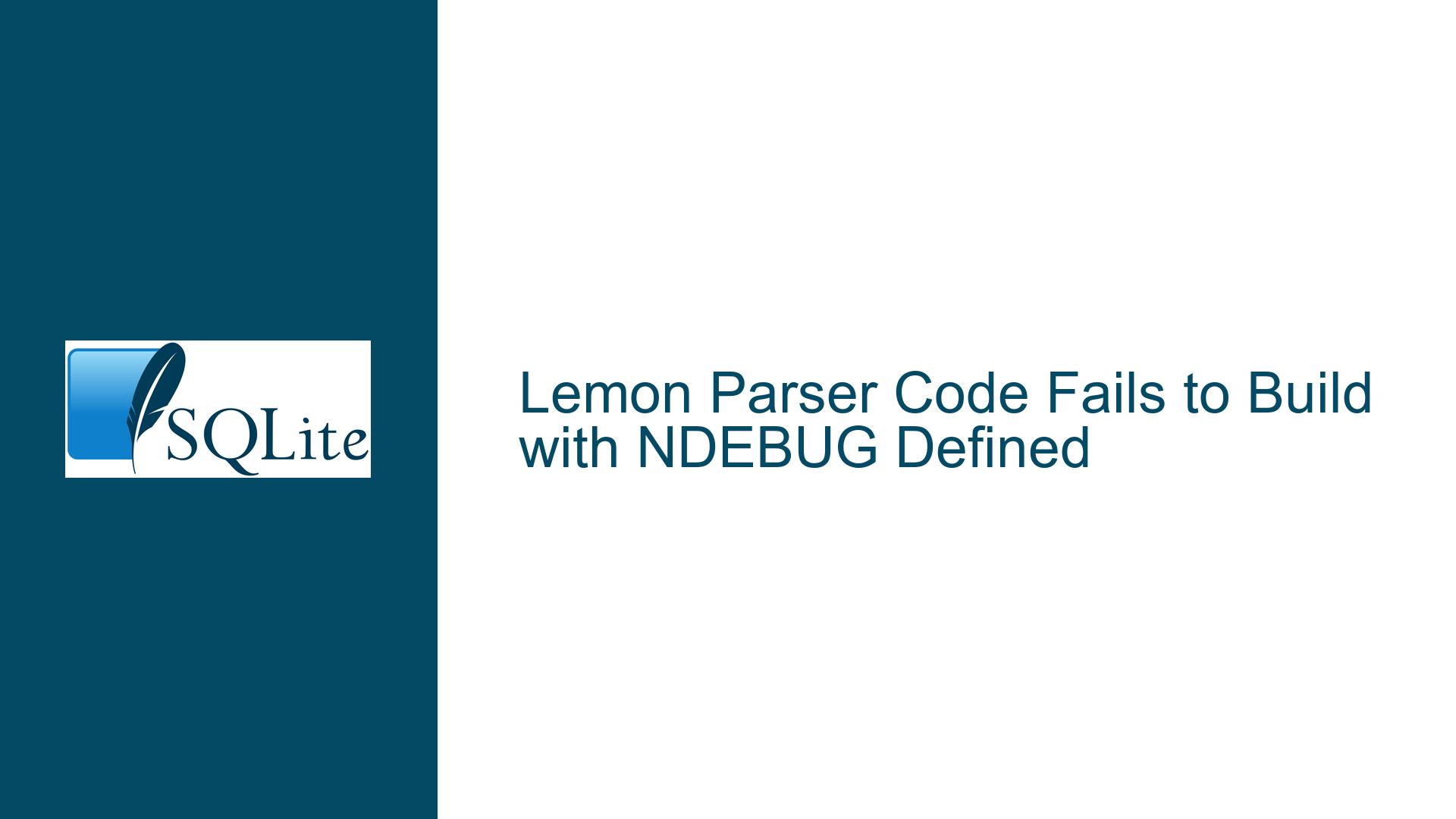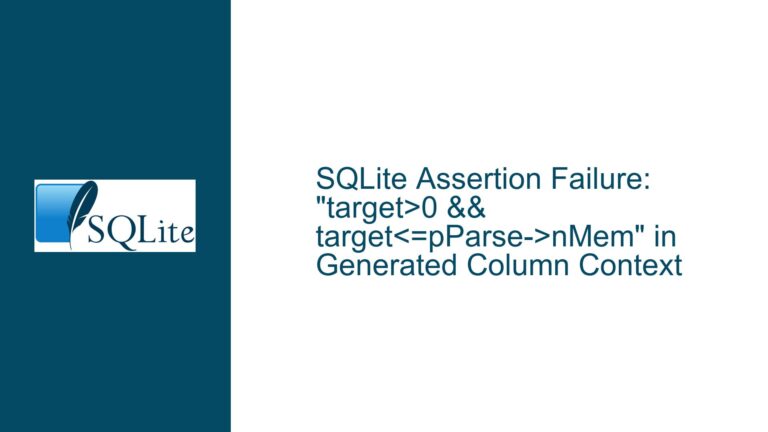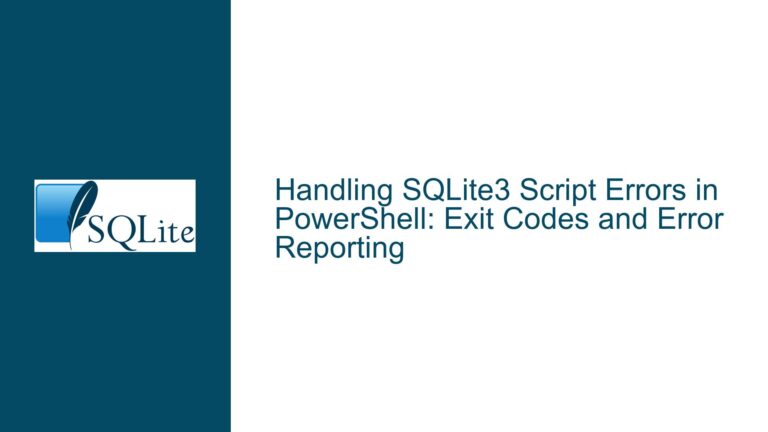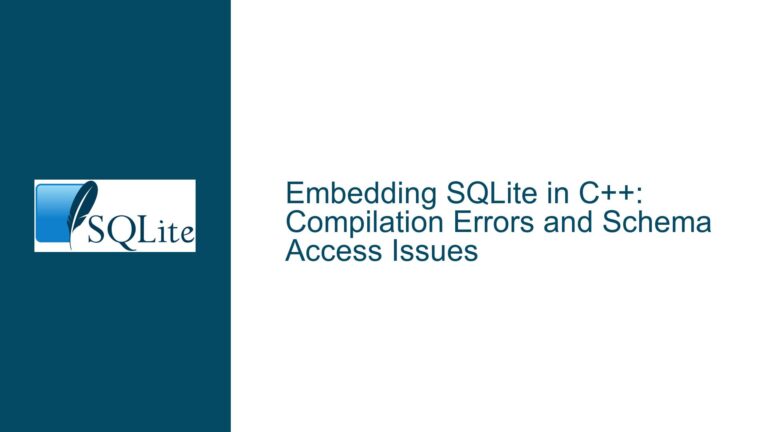Lemon Parser Code Fails to Build with NDEBUG Defined
Issue Overview: Lemon Parser Code Incompatibility with NDEBUG
The core issue revolves around the Lemon parser generator producing code that fails to compile when the NDEBUG macro is defined. The NDEBUG macro is commonly used in C and C++ projects to disable assertions, which are typically used for debugging purposes. When NDEBUG is defined, the assert macro is expected to be disabled, and any associated code should not be compiled or executed. However, the Lemon-generated code does not adhere to this expectation, leading to compilation errors.
The primary manifestations of this issue are twofold. First, the assert.h header file is only included in the generated lempar.c file when NDEBUG is not defined. This omission causes compilation errors when NDEBUG is defined because the assert macro is referenced in the code without being properly defined. Second, the variable yyRuleName is declared only when NDEBUG is not defined, but it is referenced outside of the #ifndef NDEBUG block. This inconsistency results in a compilation error when NDEBUG is defined, as the compiler encounters a reference to an undeclared variable.
The issue is particularly problematic because it affects the portability and flexibility of the Lemon-generated code. Developers often use the NDEBUG macro to create optimized release builds of their software, where debugging code, including assertions, is stripped out to improve performance. The current behavior of the Lemon parser generator prevents developers from seamlessly switching between debug and release builds, thereby complicating the build process and potentially introducing bugs in the release builds.
Possible Causes: Misaligned Preprocessor Directives and Conditional Compilation
The root cause of the issue lies in the misalignment of preprocessor directives and conditional compilation blocks within the Lemon-generated code. Specifically, the code does not consistently guard assert statements and related variables with #ifndef NDEBUG blocks. This inconsistency leads to compilation errors when NDEBUG is defined, as the compiler encounters references to undefined macros and variables.
The assert macro is typically defined in the assert.h header file, and its behavior is controlled by the NDEBUG macro. When NDEBUG is defined, the assert macro is expected to be defined as a no-op, effectively removing any assertions from the compiled code. However, in the Lemon-generated code, the assert.h header file is only included when NDEBUG is not defined. This omission means that the assert macro is not defined when NDEBUG is defined, leading to compilation errors when the macro is referenced.
Similarly, the variable yyRuleName is declared within an #ifndef NDEBUG block, but it is referenced outside of this block. This misalignment causes the compiler to encounter a reference to an undeclared variable when NDEBUG is defined. The variable yyRuleName is used in conjunction with assertions to provide debugging information, but its declaration and usage are not properly guarded by the #ifndef NDEBUG directive.
The issue is further compounded by the fact that the Lemon parser generator does not provide a mechanism for developers to easily customize the generated code to account for different build configurations. This lack of flexibility makes it difficult for developers to adapt the generated code to their specific needs, particularly when dealing with complex build systems that require different configurations for debug and release builds.
Troubleshooting Steps, Solutions & Fixes: Aligning Preprocessor Directives and Ensuring Conditional Compilation Consistency
To resolve the issue, it is necessary to align the preprocessor directives and ensure that all assert statements and related variables are properly guarded by #ifndef NDEBUG blocks. This alignment will ensure that the code compiles correctly regardless of whether NDEBUG is defined or not.
The first step in resolving the issue is to ensure that the assert.h header file is included in the generated lempar.c file regardless of whether NDEBUG is defined. This can be achieved by moving the inclusion of assert.h outside of any conditional compilation blocks. By doing so, the assert macro will always be defined, either as a no-op when NDEBUG is defined or as an active assertion when NDEBUG is not defined.
The second step is to ensure that all assert statements are properly guarded by #ifndef NDEBUG blocks. This includes moving any assert statements that are currently outside of these blocks into the appropriate conditional compilation sections. This change will ensure that the assert statements are only compiled and executed when NDEBUG is not defined, thereby preventing compilation errors when NDEBUG is defined.
The third step is to ensure that the variable yyRuleName is declared and referenced consistently within #ifndef NDEBUG blocks. This includes moving the declaration of yyRuleName outside of any conditional compilation blocks and ensuring that all references to the variable are properly guarded by #ifndef NDEBUG directives. This change will ensure that the variable is always declared and that references to it are only compiled and executed when NDEBUG is not defined.
In addition to these changes, it is also recommended to provide a mechanism for developers to customize the generated code to account for different build configurations. This could include adding configuration options to the Lemon parser generator that allow developers to specify whether assertions should be enabled or disabled in the generated code. This flexibility will make it easier for developers to adapt the generated code to their specific needs, particularly when dealing with complex build systems that require different configurations for debug and release builds.
Finally, it is important to thoroughly test the modified code to ensure that it compiles and functions correctly in all build configurations. This testing should include both debug and release builds, as well as any other build configurations that may be used in the development process. By thoroughly testing the modified code, developers can ensure that the issue has been fully resolved and that the generated code is both portable and flexible.
In summary, the issue of Lemon-generated code failing to build with NDEBUG defined can be resolved by aligning preprocessor directives, ensuring consistent conditional compilation, and providing mechanisms for customization. By making these changes, developers can ensure that the generated code compiles correctly in all build configurations, thereby improving the portability and flexibility of the Lemon parser generator.






